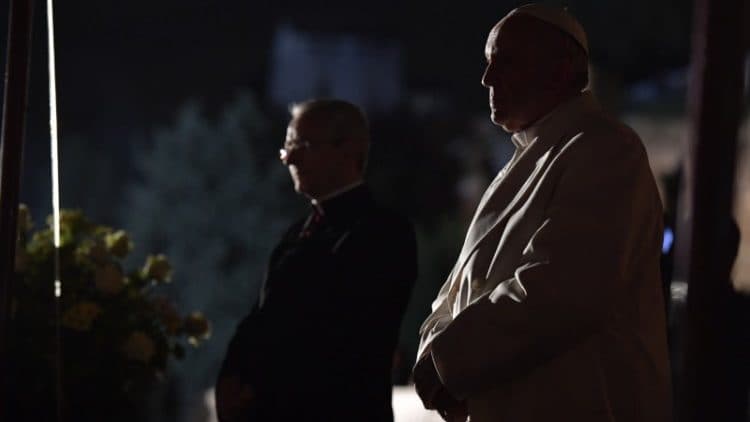The prayer of supplication includes petition. As the Holy Spirit moves within us, the first impulse toward petition is repentance. As we draw closer to God, we realize who we are before him, how we have offended his love and majesty, where we have failed to live up to our status as his sons and daughters, and we readily and wholeheartedly confess our sinfulness before him.
The Catechism of the Catholic Church explains: “The first movement of the prayer of petition is asking forgiveness, like the tax collector in the parable: ‘God, be merciful to me a sinner!’”
The image of the repentant tax collector strikes a chord in all people of goodwill. As we see and suffer from our own brokenness and sinfulness, we remove ourselves from others, keep our eyes downcast, and hope for a mercy that we do not deserve.
In his goodness, God abundantly lavishes his mercy upon us and raises us up. He calls us forward to himself and embraces us with his love and understanding.
Our prayer of repentance shows us that we are harder on ourselves than God ever would be. Our prayer discloses to us that we place more weight upon ourselves than God ever would. The living God is kind and merciful, loving and compassionate.
And so, as fallen human beings, we need to acknowledge our transgressions and seek reconciliation with the God who loves us beyond our own understanding. Such a reconciliation is necessary if we are going to nurture a vital and personal relationship with him.
It’s in his mercy that we learn trust and are able to have confidence in God. It is in mercy that we are able to approach God without fear and allow ourselves to be vulnerable before him.
Repentance and reconciliation are necessary if our prayer is going to mature and deepen. We can only pray as deep as we trust God. We can only pray to the degree that we know of God’s love for us.
And so, repentance is needed for true, heartfelt prayer. As the Catechism says simply: “[Repentance] is a prerequisite for righteous and pure prayer.”
As we repent before God and seek union with him, we are led down the difficult and winding – but liberating – path of humility. Humility is the only way to the heart of God. It is humility that opens the doors of our heart and allows us to truly and fully trust God.
As the Catechism teaches: “A trusting humility brings us back into the light of communion between the Father and his Son Jesus Christ and with one another, so that we receive from him whatever we ask.’”
Humility brings forth our relationship with God. It is the avenue to union with him. By having the humility to acknowledge our faults and ask for help, we hold nothing back, we realize and express our poverty of spirit before the God who can forgive us, heal us, restore us, and lift us up. If there is no humility, then we are left in the swirling cesspool of our own broken, failed efforts to find restoration and healing in ourselves. We are stuck in our sin and pride. We are alone fumbling in darkness trying to find a way out but are left going in circles and finding no consolation or redemption.
We need a humility that will lead us to repentance and to that union with God that brings liberation and renewal.
The path of repentance and humility are not only needed for personal prayer, but also for our full, active, and conscious participation in the Eucharistic liturgy of the Church. As the Catechism tells us: “Asking forgiveness is the prerequisite for both the Eucharistic liturgy and personal prayer.”
Such a posture is something we are called to bring to the altar of God if we wish to truly participate in the sacrifice of the Lord. The Church guides us in this approach by placing a penitential rite at the very beginning of Mass. The Church is teaching and leading us to repentance and humility so that we can have pure hearts and righteous prayer before the sacrifice by which Jesus Christ saves us and brings redemption to humanity.
There is no prayer and no growth in the spiritual life without repentance.














